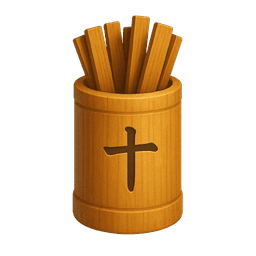I. What is Bazi?
The full name of 'Bazi' is 'Four Pillars and Eight Characters' (四柱八字). It is a core tool in traditional Chinese metaphysics used to predict information regarding an individual's destiny, personality, health, marriage, and other aspects.
-
Definition and Composition:
- 'Bazi' literally means 'eight characters'. These eight characters are derived from a person's birth year, month, day, and hour, converted using the traditional Chinese Ganzhi (Heavenly Stems and Earthly Branches) system for marking years, months, days, and hours.
- Specifically, each of these four time points—year, month, day, and hour—is composed of one Heavenly Stem and one Earthly Branch, totaling two characters per point. With four such points, there are eight characters in total, hence the name 'Bazi'.
- For example, if someone is born in the Jiazǐ year, Bǐngyín month, Dīngmǎo day, and Wùchén hour, their Bazi would be 'Jiazǐ, Bǐngyín, Dīngmǎo, Wùchén'.
-
Function and Principle:
- Bazi theory posits that the celestial movements and the state of the Five Elements (Wuxing) energy field at the time of a person's birth determine their innate life information. These eight characters encapsulate the prosperity, decline, generation, overcoming, control, and transformation relationships of Yin and Yang and the Five Elements (Metal, Wood, Water, Fire, Earth).
- Metaphysicians analyze the complex relationships within the Bazi, such as the strength and weakness of the Five Elements, their flow, clashes, combinations, punishments, and harms. By combining this analysis with the Grand Cycles (each representing a ten-year fortune cycle) and Annual Cycles (each representing a one-year fortune cycle), they deduce an individual's good or bad fortune, career and wealth prospects, romantic relationships and marriage, health status, and personality traits.
- It is an important manifestation of the 'unity of Heaven and humanity' (天人合一) philosophy in Chinese culture, applied to personal destiny prediction.
II. What does Sizhu mean?
'Sizhu' refers to the four time elements of a person's birth—year, month, day, and hour. They form the foundation and framework upon which the 'Bazi' is constructed.
-
Definition and Composition:
- 'Sizhu' literally means 'four pillars'. These four pillars represent the four temporal dimensions at the time of a person's birth:
- Year Pillar: The Ganzhi combination of the birth year.
- Month Pillar: The Ganzhi combination of the birth month.
- Day Pillar: The Ganzhi combination of the birth day (also known as the 'Day Master' or 'Day Stem', representing the individual themselves).
- Hour Pillar: The Ganzhi combination of the birth hour.
- Each 'pillar' consists of one Heavenly Stem (e.g., Jia, Yi, Bing, Ding, etc.) and one Earthly Branch (e.g., Zi, Chou, Yin, Mao, etc.), totaling two characters.
- 'Sizhu' literally means 'four pillars'. These four pillars represent the four temporal dimensions at the time of a person's birth:
-
Function and Principle:
- Sizhu serves as the starting point for metaphysical analysis. It discretizes the continuous concept of birth time into four interconnected energy information units, each with independent significance, through the Ganzhi system.
- Using specific algorithms (e.g., the Year Pillar is determined by Lìchūn (Start of Spring), the Month Pillar by solar terms (Jiéqì), the Day Pillar by the Ganzhi calendar, and the Hour Pillar by the Five Rat Escapes (Wǔshǔ Dùn) method based on the Day Stem), the birth time (Gregorian or Lunar) is converted into these four pillars.
- The Four Pillars are the structural carrier of the 'Eight Characters'; without the Four Pillars, there would be no Eight Characters.
III. What are the differences between them?
Although 'Bazi' and 'Sizhu' are often mentioned together and even used interchangeably in casual conversation, in the professional context of metaphysics, they have distinct definitions and differences:
-
Different Objects of Reference:
- Sizhu (Four Pillars): Refers to the four temporal dimensions—year, month, day, and hour—that constitute a destiny chart. It is a collective term for the framework, structure, or categories. It emphasizes 'four points in time'.
- Bazi (Eight Characters): Refers to the eight specific Ganzhi symbols derived from these four temporal dimensions. It is a collective term for the content, information, or manifestation. It emphasizes 'eight characters'.
-
Conceptual Relationship:
- Sizhu is the foundation, and Bazi is the result. First, there are the four 'pillars'—Year Pillar, Month Pillar, Day Pillar, and Hour Pillar. Then, each pillar consists of two Ganzhi characters, which together form the 'Bazi'. Sizhu can be understood as a noun concept, while Bazi is a quantitative concept.
- 'Sizhu' conceptually refers to 'four pairs', while 'Bazi' refers to 'eight characters' textually. Each 'pillar' is composed of 'one Heavenly Stem and one Earthly Branch', so Four Pillars essentially mean Eight Characters.
-
Quantitative Difference:
- 'Sizhu' clearly refers to 'four components'.
- 'Bazi' clearly refers to 'eight characters'.
-
Illustrative Metaphor:
- If a person's destiny chart is likened to a house, 'Sizhu' would be the structural pillars like the 'foundation, walls, and roof'; whereas 'Bazi' would be the specific materials and symbols, such as 'bricks, cement, and steel bars,' that make up these pillars.
- Alternatively, 'Sizhu' can be understood as the 'rows' of a table (year, month, day, hour), and 'Bazi' as the 'specific content' (Heavenly Stems and Earthly Branches) filled into each 'row' of the table.
In summary, 'Sizhu' are the four crucial components in metaphysics that describe the birth period, while 'Bazi' are the eight Heavenly Stem and Earthly Branch symbols specifically manifested by these 'Four Pillars'. They represent different perspectives of the same metaphysical system, are interdependent, and inseparable.
